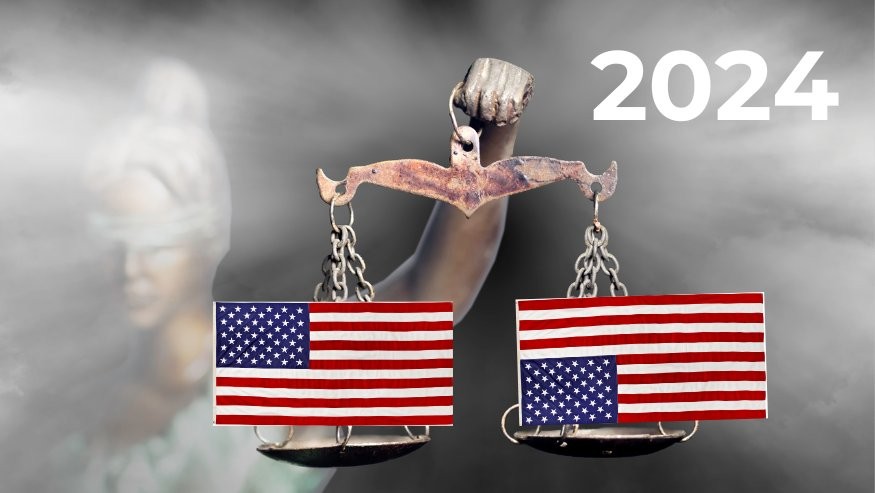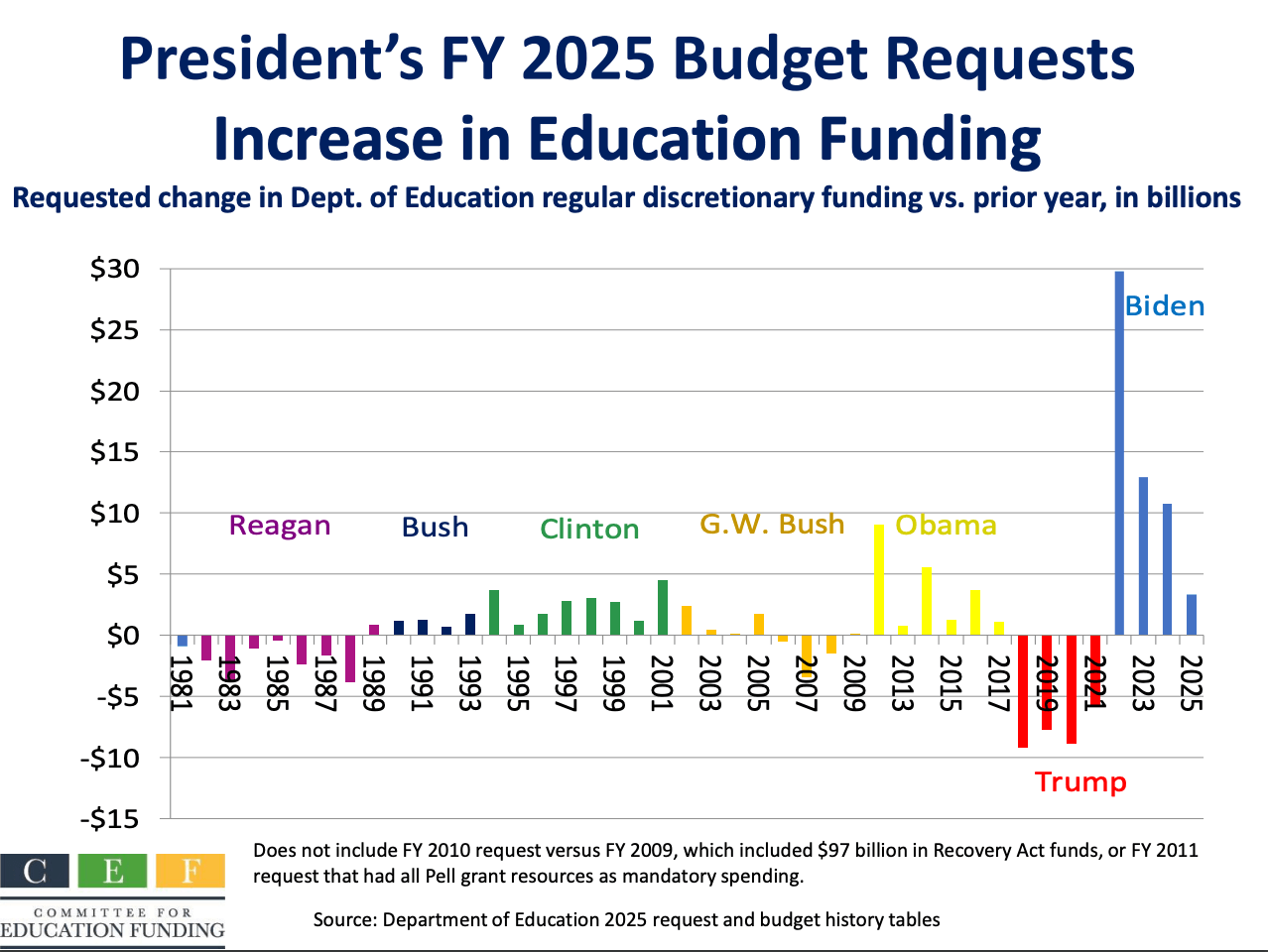Kamala, Trump, and public education

A great divide: Public education vs private
Public education is a huge part of life in America, but in the press and on the campaign trail, education policy has taken a back seat to other really important national issues, such as eating dogs and the size of crowds.
This does not mean you should ignore education policy in deciding how to vote. Far from it. This election could determine whether our nation takes a path toward strengthening public schools or abandoning them for a more private system.
The differences in philosophy between Harris and Trump are quite stark, and the results of this election could lead to changes not only in how schools are funded and governed but in the way important subjects are taught. At stake is what our children learn about their rights and responsibilities as citizens, including commitment to democracy.
This post reviews the differences between the candidates on education based on their records as well as their stated intentions. In a nutshell, the Harris/Biden record and campaign statements point to incremental change and increased support for students and traditional public schools. Trump’s record and campaign statements point to reduced funding for public education and new subsidies for private and religious education.
|
Trump's View |
Harris's View |
|---|---|
|
"School Choice, Vouchers, Private Schools, Freedom, and Patriotism" are words Trump chooses to define his view of education. |
High quality and affordable public education is the pathway to the middle class. |
Budgets are statements of values
Leaders should not just be evaluated on what they say. The real test is where they put money. Budgets express values. The records of former president Trump and Vice-President Harris reflect dramatic differences.
The president proposes and the legislature disposes
Each year the President proposes an education budget. After much wrangling, the legislature adopts a budget.
President Trump. In every year of his administration, he proposed cuts to funding for public education. The legislature did not enact these cuts. Click each year below to see what was proposed and what was finally enacted.
Biden/Harris The Biden/Harris administration proposed large funding increases for public education. Click each year below to see what was proposed and what was finally enacted.
The chart below contrasts the significant differences between former president Trump and Biden/Harris in terms of resources for the US Department of Education.

Background: the federal role in education
The role of the federal government in public education has evolved over time.
The United States Constitution makes no mention of education. Public education in America began as a local matter and gradually became a responsibility of state governments. Federal funds have generally accounted for less than 10 percent of overall funding for K-12 education, though they play a somewhat larger role in schools where needs are greatest. Political philosophies can influence how funds are used.
Federal funding for K-12 includes targeted support for:
- Low income students (Title I)
- Students with disabilities (IDEA)
- School meals (NSLP)
- Pre-school (Head Start)
- See all Elementary and Secondary Programs
Some federal programs have been designed to create incentives for states and districts to adopt specific policies. For example, federal incentives implemented under the No Child Left Behind Act played an important role in the widespread measurement of success in school systems using test scores and measurements of attendance.
The candidates' plans: The past is prologue
Both candidates are doubling down on their records. Harris supports greater investments in education, especially affordable high-quality child care, preschool, and student debt reduction. Trump, who wants to dramatically reduce the role of the federal government in education policy, proposes to eliminate the Department of Education and preschool programs like Head Start, and supports subsidies for private and religious schools.
There are also stark differences in philosophy over how history is taught and the role of the federal government in enforcing civil rights.
The friends you keep
In politics as in life, you are frequently known by the friends you keep. Harris is supported by the major supporters of public eduction, including the American Federation of Teachers (AFT) and the National Education Association (NEA). Many of Trump's ideas align with conservative think tanks, such as the Heritage Foundation and the America First Policy Institute.
Messages of the Trump Campaign
A large coalition of conservative organizations developed the 2025 Presidential Transition Project, which presents a clear plan to dramatically change federal support of public education. While not officially adopted by Mr. Trump, it details radical changes in the federal education role. Many of the proposals are fully in line with Trump’s education plan, known as Agenda 47.
If Trump wins reelection and the Republicans take control of Congress, these are the marching orders for education:
|
Conservative 2025 Presidential education Transition Plan |
|
|---|---|
|
Eliminate the Department of Education: “Federal education policy should be limited and, ultimately, the federal Department of Education should be eliminated.” |
This would be accomplished by reducing the number of programs managed by the Office of elementary and secondary education and transferring some remaining programs to other federal agencies. Most of the activities of the federal government should be limited to statistics gathering. Trump has vowed to get rid of the Department of Education in a second term. |
|
Restore local and state government control |
Funding would be sent to local agencies as grants with no strings attached. e.g. Students with disabilities (IDEA) Title l |
|
Take money away away from public schools to be used for private and religious schools “Ultimately, every parent should have the option to direct his or her child’s share of education funding through an education savings account (ESA), funded overwhelmingly by state and local taxpayers, which would empower parents to choose a set of education options that meet their child's unique needs.” |
Trump has expressed strong support for vouchers and school choice. |
|
End Title I federal funding for low income students within 10 years. |
Note: About 63 percent of traditional public schools and 62 percent of public charter schools are Title I eligible. |
|
Ban Critical Race Theory and increase parent rights. Enforcement of civil rights should be based on a proper understanding of those laws, rejecting gender ideology and critical race theory. |
President Trump promises to “turn the tide of left-wing indoctrination and once again respect the fundamental right of parents to control the education, healthcare, and moral formation of their children.” |
|
Strengthen protections for faith-based educational institutions and programs |
“Freedom to pray” in public schools. |
|
Defund Head Start |
Reduce availability of preschool programs. |
|
Reduce Title IX |
Trump will ask Congress to pass a bill establishing that the only genders recognized by the United States government are male and female—and they are determined at birth. (Agenda 47). President Trump will also make clear that Title Nine prohibits men from participating in women’s sports. |
Fact Check: False
In the following video and its accompanying web page, Donald Trump asserts that America spends dramatically more than other countries on public education. This is false. Each state in the US varies in its level of effort to fund education, but in context most states compare favorably to international norms. The federal share of school budget funding is important but small.
Trump also asserts that the outcome of US schools is “at the bottom every list”. This is false. American students score about average compared to students in countries with similar economies.
Biden/Harris education policy proposals

The Biden/Harris 2025 education budget proposes to increase federal education funding by 4 percent, with few changes in policy direction. Investments to help the most needy students remain a high priority.
As mentioned above, the federal role in funding public education, while important, comprises less than a tenth of overall education spending. Most of the money comes from state and local governments.
|
Biden/Harris Education Policy Proposals 2025 |
|
|---|---|
|
Early Education |
New investments in readiness for preschool in school- and community-based settings, including Head Start, for children eligible to attend Title I schools. Note: Harris proposes to ensure parents can afford high-quality child care and preschool for their children and wants to expand the Child Tax Credit |
|
Trim student debt |
Biden/Harris provided nearly $170 billion in student debt relief for almost five million borrowers |
|
Lower college costs |
Increased the maximum Pell Grant award by $900 — the largest increase in more than a decade — and invested in community colleges. |
|
Enforce civil rights |
Increase funding for the Department of Education Office for Civil Rights to protect equal access to education. |
|
Academic support |
High-dosage tutoring, expanded summer school, extended learning, and afterschool learning opportunities. |
|
Teachers |
Invest in educator preparation, development, and leadership to build a diverse and well-prepared teacher pipeline and address shortages of special education teachers and providers. Harris specifically wants to increase teacher pay. |
|
Second languages |
Expand access to multilingual programs. |
|
Book banning |
Harris is against policies that ban books on the basis of race, gender and sexual orientation. |
|
Mental Health |
Increase school-based mental health services |
|
Special Needs |
Increase funding to support children and youth with disabilities. |
|
College Affordability |
Increase the maximum Pell Grant Expand dual enrollment. |
|
Low income students |
Increase Title I funding. |
|
Title IX |
Supports expanded protection against sex-based harassment and discrimination. |
What will our children learn?
As Abraham Lincoln put it, “the philosophy of the school room in one generation will be the philosophy of the government in the next.”
At issue is not only money but how our children will be taught the constitutional rights of free speech, the rights and restrictions of peaceable assembly, the right to vote, and the obligation to follow the law.
An unprecedented question
At the time of this election cycle, a candidate for president and his political operatives are embroiled in issues that go to the heart of our democracy. There are accusations of interfering with the election process in many states. The Cline Center, which has studied the transition of power across the globe for decades, categorizes the last election as a failed attempted coup.
These accusations have bearing on what we teach our children about democracy. The right to vote. The right to free speech. The right to due process of law. The presumption of innocence.
Ed100 concerns itself with education, including the role of schools in civic education. In the coming election, what lessons will our children learn?
Tags on this post
All Tags
A-G requirements Absences Accountability Accreditation Achievement gap Administrators After school Algebra API Arts Assessment At-risk students Attendance Beacon links Bilingual education Bonds Brain Brown Act Budgets Bullying Burbank Business Career Carol Dweck Categorical funds Catholic schools Certification CHAMP Change Character Education Chart Charter schools Civics Class size CMOs Collective bargaining College Common core Community schools Contest Continuous Improvement Cost of education Counselors Creativity Crossword CSBA CTA Dashboard Data Dialogue District boundaries Districts Diversity Drawing DREAM Act Dyslexia EACH Early childhood Economic growth EdPrezi EdSource EdTech Education foundations Effort Election English learners Equity ESSA Ethnic studies Ethnic studies Evaluation rubric Expanded Learning Facilities Fake News Federal Federal policy Funding Gifted Graduation rates Grit Health Help Wanted History Home schools Homeless students Homework Hours of opportunity Humanities Independence Day Indignation Infrastructure Initiatives International Jargon Khan Academy Kindergarten LCAP LCFF Leaderboard Leadership Learning Litigation Lobbyists Local control Local funding Local governance Lottery Magnet schools Map Math Media Mental Health Mindfulness Mindset Myth Myths NAEP National comparisons NCLB Nutrition Pandemic Parcel taxes Parent Engagement Parent Leader Guide Parents peanut butter Pedagogy Pensions personalized Philanthropy PISA Planning Policy Politics population Poverty Preschool Prezi Private schools Prize Project-based learning Prop 13 Prop 98 Property taxes PTA Purpose of education puzzle Quality Race Rating Schools Reading Recruiting teachers Reform Religious education Religious schools Research Retaining teachers Rigor School board School choice School Climate School Closures Science Serrano vs Priest Sex Ed Site Map Sleep Social-emotional learning Song Special ed Spending SPSA Standards Strike STRS Student motivation Student voice Success Suicide Summer Superintendent Suspensions Talent Taxes Teacher pay Teacher shortage Teachers Technology Technology in education Template Test scores Tests Time in school Time on task Trump Undocumented Unions Universal education Vaccination Values Vaping Video Volunteering Volunteers Vote Vouchers Winners Year in ReviewSharing is caring!
Password Reset
Search all lesson and blog content here.
Login with Email
We will send your Login Link to your email
address. Click on the link and you will be
logged into Ed100. No more passwords to
remember!















Questions & Comments
To comment or reply, please sign in .
Jeff Camp - Founder October 20, 2024 at 2:34 pm